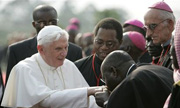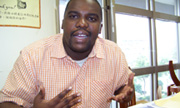
TAIPEI, Taiwan– While international health organizations say condoms are important in the fight against AIDS, Pope Benedict XVI believes they worsen problem and abstinence is the best choice.
And, one national of Swaziland, where HIV/AIDS prevalence is “very high”, believes that combining both approaches might be the best way to curb the disease.
“You can’t resolve it with the distribution of condoms. On the contrary, it increases the problem,” the pope said this month during a visit to Africa, the fastest-growing region for the Roman Catholic church and where 22 million people live with AIDS.
An Associated Press report quoted the pope as saying that a responsible and moral attitude toward sex would help fight the disease.
The Catholic Church opposes using condom as part of its overall teaching against artificial contraception and urges fidelity in marriage and abstinence from premarital sex as key weapons in the fight against AIDS.
United Nations Joint Programme on HIV/AIDS (UNAID) statistics shows that three-quarters of all AIDS deaths worldwide in 2007 were in sub-Saharan Africa.
UNAIDS, United Nations Population Fund (UNFPA), and World Health Organization (WHO) Condoms and HIV Prevention Position Statement says condom use is a critical element in a comprehensive, effective and sustainable approach to HIV prevention and treatment.
It further said that condom use must be promoted since prevention is the mainstay of the response to AIDS and that condoms are an integral and essential part of comprehensive prevention and care programmes.
“You cannot guarantee that condoms can prevent HIV and AIDS because condoms break. But it is better than not using it. I will suggest that people use condoms,” Dumezweni Dlamini a Swazi student at the Ming Chuan University Graduate School of International Affairs told I Witness – News.
“But at the same time, if you tell people to use condoms, especially young people, you sort of say it is okay to have sex; go ahead and have fun but use a condom,” he said.
UNAIDS estimates that as of 2007, 190 000 of Swaziland’s 1.1 million people were living with HIV/AIDS.
“I will agree with the pope by saying that the best way to protect yourself is to abstain – not have sex at all, or just wait ‘til the right time, wait ‘til you find the right partner,” Dlamini further said.
He said that his people’s failure to act on the HIV/AIDS information disseminated, prostitution, and polygamy are among the causes of the “very high” rates of infection.
“…It seems as if even though they know the consequences of unsafe sex they will do it anyway and forget about the consequences,” he said.
“Some people know how to handle polygamy and some people do not know how to handle it.”
Dlamini, a Christian, says that the church should not change its approach to the HIV epidemic.
“I think the church should continue preaching about abstinence. But, because by nature we are sinful, we don’t listen sometime, it is probably best to say if you are not going to listen then just make sure you use a condom…
“I am not saying it is okay to sleep around with multiple partners or it is okay to have premarital sex, but if you are going to do it — if you are not going to listen — it is better to use a condom. But the best way to prevent yourself from any STD is to abstain and wait for the right partner,” he said.

The UNAIDS –UNFPA–WHO-statement said recent analysis of the AIDS epidemic in Uganda shows that increased condom use, delaying the age of first sexual intercourse and reduction of sexual partners was an important factor in the decline of HIV prevalence in the 1990s.
It further said that the de-stigmatization of condom and promotion of condom use among sex workers and their client in Thailand has reduced HIV infections in that Asian nation.
A similar policy in Cambodia has helped stabilize national prevalence, while substantially decreasing prevalence among sex workers.
In addition, Brazil’s early and vigorous condom promotion among the general population and vulnerable groups has successfully contributed to sustained control of the epidemic, the statement said.
The pope has been criticized for his comment both in Africa and internationally.
A New York Times editorial said while the pope has every right to voice his disagreement with condom use in keeping with his religious beliefs “he deserves no credence when he distorts scientific findings about the value of condoms in slowing the spread of the AIDS virus.”
The publication said that while pope was right in saying that condoms alone cannot halt the spread of HIV, “there is no evidence that condom use is aggravating the epidemic and considerable evidence that condoms, though no panacea, can be helpful in many circumstances”.
It further said that condoms work well in preventing transmission of the AIDS virus from infected to uninfected people. And that the Centers for Disease Control and Prevention cites “comprehensive and conclusive” evidence that latex condoms, when used consistently and correctly, are “highly effective” in preventing heterosexual transmission of the virus that causes AIDS.
In Africa, Rebecca Hodes with the Treatment Action Campaign in South Africa said the pope’s objection to condoms “conveys that religious dogma is more important to him than the lives of Africans,” the Associated Press reported.
The publication said Hodes said the pope was right that condoms are not the sole solution to Africa’s AIDS epidemic, but added they are one of the very few proven measures to prevent HIV infections.
“What the pope says is an ideal for the Catholic church. But he needs to look at the realities on the ground. One should be aware of these realities. In the case of Cameroon – and Africa as a whole – condoms are very necessary … You need condoms to prevent AIDS and birth control,” Stanley Obale Okpu, a civil servant working in the ministry of urban development in Cameroon, told the Associated Press.





